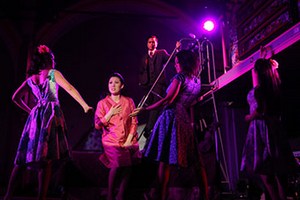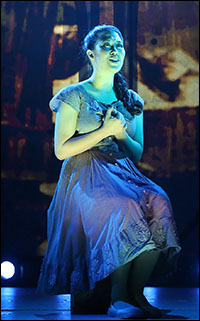A CurtainUp Review
Here Lies Love
By Jon Magaril
|

Ruthie Ann Miles and Cast (Photo: Joan Marcus)
|
The state-of-the-art design elements impress even more under greater scrutiny. The first time around, some of Clint Ramos's costumes seemed ill-fitting. No longer. He's got the famous Imelda frocks down cold. But special props go to the day-glo jumpsuits worn by the hard-bopping set-and-audience movers. They'd deservedly stand out in any crowd.
Justin Townsend's lighting sets our pupils bouncing with delight and also provides rare moments of mysterious beauty in its visions of small town Filipino life. Peter Nigrini's eye-grabbing projections are so prodigious, with varied images running simultaneously on different walls, that one may notice something new even if returning for the umpteenth time.
Annie-B Parson's choreography has a sinuously arresting signature whether depicting Studio 54 revelers, promenading Filipino debutantes, or grief-stricken demonstrators. Most importantly, Alex Timbers proves, even more than in his underrated work on Rocky, to be the eminent theatrical party planner of our time. The only problem is he seems uninterested in digging too deeply beneath the smooth surface of a project.
Among the main performers, all holdovers from the original run, only Ruthie Ann Miles's Imelda has grown. Her impenetrable, chilly demeanor has a newly scarifying sheen. Jose Llana still finds little to hold our interest in his too-young Ferdinand Marcos, who was nearly four decades older than Imelda. Conrad Ricamora's Aquino remains ebulliently charismatic, but he hasn't found another gear for the late-arriving drama of the final section. It's once again left to the blazing Natalie Cortez, in her only featured moments, to stir our emotions as his mother.
The assassination of Ferdinand Marcos' rival Ninoy Aquino and the Marcos' subsequent departure, both set on the airport's tarmac, is stirringly staged. We're herded together into two large groups as if onlookers to the events. And then we sit on risers for the acoustic finale, with lyrics based on testimony from witnesses to the People Power Revolution.
Whatever depth the piece may have acquired is swept aside almost immediately by the dance-with-the cast encore of the infectious title number. It's a savvy commercial move, letting the audience out on a contact high. But it may prove offensive to anyone with an intimate connection to victims of the Marcos regime.
All would be well if the encore were tied to Imelda's recent return to power, with her election to the Philippines' House of Representatives. As long as the production is tied to her seemingly superficial perspective, Here Lies Love stands as the most exhilarating party revolution in town. My original review and production notes below. For performance times check the website:www.herelieslove.com/?gclid=CNP3ipjdnr4CFWdo7AodqzQAUQ
| "Just look at Nixon/They tore him apart/How could you be so hard?/I gave you my heart" — Imelda in “Why Don't You Love Me?”
|

Ruthie Ann Miles
(Photo by Joan Marcus) |
Now, visionary musician and lyricist David Byrne presents a different slant, by taking a walk in her own infamous shoes. The result is a party. It's a disco. But it still ain't no fooling around. Byrne's exploring a different kind of “Life During Wartime.” He depicts Imelda's role in her husband's cutthroat regime, including the declaration of martial law, the assassination of political rival (and Imelda's early boyfriend) Benigno Aquino, and the People Power revolution.
Inspired by her proclivities — Imelda had a mirrorball installed in her apartment — Byrne has placed her life story within the context of a dance club. The contrast between serious politics and frivolity gives the sung-through work its start-to-finish fascination. The off-kilter blend of content and tone extends to the songs themselves.
The lyrics often quote the participants' speeches, interviews, and wire-tapped recordings. But they're set to the styles of music that has formed the soundtrack to her life — early disco, soul, funk, and Latin rhythms.
Byrne's talent extends to his knack for picking the right collaborators, which in the past have included Brian Eno, St. Vincent, and of course the members of his seminal band Talking Heads. Each has drawn out a different side of his protean abilities. Here he's had the good sense to team up with legendary DJ and musician Fatboy Slim (aka Norman Cook), who's supplied most of the infectious beats.
The irresistibly ecstatic title song, for instance, cites Marcos's desire to have her tombstone inscribed with “Here lies love.” It's easily the best in the score and, for that matter, the entire theater season. Gorgeously sung by the endearing Ruthie Ann Miles, it puts us happily in her, and Imelda's, pocket even as she sashays down an increasingly incriminating path.
The audience has an easier time staying on her side, because we're often by her side. There are no seats, except very few above in the balcony. We move around the space to get close to the action and to get away from set designer David Korins' maraudingly mobile platforms. They're constantly being moved into fresh configurations across the playing space by attendants in pink jumpsuits, courtesy of resourceful costume designer Clint Ramos.
We play more roles than many in theensemble cast. We're voters at various campaign rallies, guests at the Marcos' wedding, dignitaries at a funeral procession, and, in what may strike fear into many potential audience members, disco dancers. Rest assured, it's all in good fun. No one is singled out beyond shaking a performer's hand or extending one to help them down to the floor.
Byrne has been especially astute in choosing rising young director Alex Timbers. From his own pieces on other influential leaders like L Ron Hubbard (A Very Merry Scientology Pageant) and Andrew Jackson (Bloody Bloody Andrew Jackson) to his co-direction of Peter and the Star-Catcher, Timbers has matched a satirical edge with an all-embracing ebullience. He always makes the audience feel that they've've been warmly invited to the hippest party of the year.
Timbers' work here is a triumph of brilliant stagecraft. There's usually something going in various corners of the playing space, but somehow the production never seems busy.
The logistics of coordinating a 360-degree multi-media extravaganza with a promenading audience would test the sanity of most anyone. But here, it all miraculously comes off without a hitch or a dip in energy.
Timbers brings out the best in his creative team, including Justin Townsend's neon-hued lighting design, M. L. Dogg and Cody Spencer's crystal clear sound design, and Peter Nigrini's phenomenal projections. They keep us rooted in time while simultaneously immersing us in a heady historical phantasmagoria.
The climax, in which a helicopter takes Imelda away from the Philippines, trumps Miss Saigon's epic special effect for a fraction of the price. The synthesis of light and sound is a pulse-quickening symphony of design and emotion.
Annie-B Parson's choreography, like Byrne's writing, quotes the various styles of the period with wit, ingenuity, and individuality. And credit has to go to Production Stage Manager Alaina Taylor and her staff for not killing anyone.
Timbers' cast is hard-working, easy on the eyes, and, despite the unpredictable presence of audience members in their face, calmly centered. The leads subtly chart changes in their characters as they jockey for recognition from us and each other.
Conrad Ricamora brings a youthful rectitude to Aquino, which makes him likeable even as he rejects Imelda early on because her poverty is a hindrance to his political aspirations. Jose Llana allows his own charisma to serve as Ferdinand Marcos' without trying to distance himself from the man's adultery and chicanery. Melody Butiu's warm-hearted Estrella, Imelda's childhood friend, is the closest the piece gets to presenting a character in which we can happily see ourselves.
Miles' Imelda brings shading to both sides of this “star and slave.” Though clearly culpable in nefarious activities, she still asks “Why Don't You Love Me?” We may laugh at her cluelessness and marvel at her narcissism, but Miles also helps us see her need. She's so successful I didn't need the coda, “God Draws Straight.” It's delivered powerfully by Kelvin Moon Loh, who'd been our DJ/MC. But the acoustic number feels like the creators' attempt at making sure the club conceit is seen as a reflection of Imelda's limited perspective, not their own. And the sing-along that accompanies the curtain call is jaunty fun but undermines the deeply satisfying mixed emotions of the final sequence.
The possible scenarios for the production's future are almost as intriguing as the show itself. It's too expensive to run for an extended period of time at The Public, but it requires intimacy and a flexible space that are almost impossible to find in the city. Like the exhilarating joy of staying close to the action, I look forward to following the production to its next location.
|
Here Lies Love Concept and Lyrics: David Byrne Music: David Byrne and Fatboy Slim Additional music: Tom Gandey, J Pardo Directed by Alex Timbers Cast: Renee Albulario (Ensemble), Melody Butiu (Ensemble), Natalie Cortez (Ensemble), Debralee Daco (Ensemble), Joshua Dela Cruz (Ensemble), Jose Llana (Ferdinand Marcos), Kelvin Moon Loh (Ensemble), Jeigh Madjus (Ensemble), Ruthie Ann Miles (Imelda Marcos), Maria-Christina Oliveras (Ensemble), Conrad Ricamora (Aquino), Trevor Salter (Ensemble), and Janelle Velasquez (Ensemble) Choreography: Annie-B Parson Scenic Design: David Korins Costume Design: Clint Ramos Lighting Design: Justin Townsend Sound Design: M. L. Dogg and Cody Spencer Projection design by Peter Nigrini Music supervisor: Kimberly Grigsby Production stage manager: Alaina Taylor Fight director: Jacob Grigolia-Rosenbaum Public Theater/LuEsther Hall 425 Lafayette Street, at Astor Place, East Village; (212) 967-7555, publictheater.org. From 4/02/13; opening 4/23/13; closing 7/28/13 after several extensions Running time: 85 minutes with no intermission Reviewed by Jon Magaril |
| REVIEW FEEDBACK Highlight one of the responses below and click "copy" or"CTRL+C"
Paste the highlighted text into the subject line (CTRL+ V): Feel free to add detailed comments in the body of the email. . .also the names and emails of any friends to whom you'd like us to forward a copy of this review. Visit Curtainup's Blog Annex For a feed to reviews and features as they are posted add http://curtainupnewlinks.blogspot.com to your reader Curtainup at Facebook . . . Curtainup at Twitter Subscribe to our FREE email updates: E-mail: esommer@curtainup.comesommer@curtainup.com put SUBSCRIBE CURTAINUP EMAIL UPDATE in the subject line and your full name and email address in the body of the message. If you can spare a minute, tell us how you came to CurtainUp and from what part of the country. |



 Anything Goes Cast Recording
Anything Goes Cast Recording Book of Mormon -CD
Book of Mormon -CD